Red Sox Postseason: Five players who need to step up in ALCS

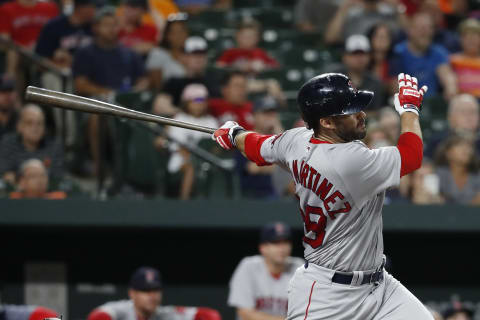
These five players need to step up if the Boston Red Sox have any hope of dethroning the Houston Astros in the American League Championship Series.
The Boston Red Sox have made it out of the first round of the postseason for the first time since 2013 when they won their last World Series. Now the reigning champion Houston Astros stand in their path to a title. It’s a tall task that will only be possible with contributions from every member of the roster. That means a few players who underwhelmed in the ALDS against the New York Yankees need to step up.
This series is a rematch of last year’s ALDS, won convincingly by the Astros three games to one. Houston outscored Boston 24-18, a gap that undersells how dominant the Astros were.
Both teams have since upgraded for another postseason encounter where the stakes have been raised. The Red Sox added slugger J.D. Martinez to anchor the best lineup in baseball while the Astros added Gerrit Cole to solidify the league’s best pitching staff. Both players exceeded expectations to help fuel their respective teams to the postseason and they each performed well in the ALDS.
However, not everyone is off to a great start this postseason. The Red Sox managed to advance despite the struggles of a few key players but they will need more out of these five in order to move on to the World Series.
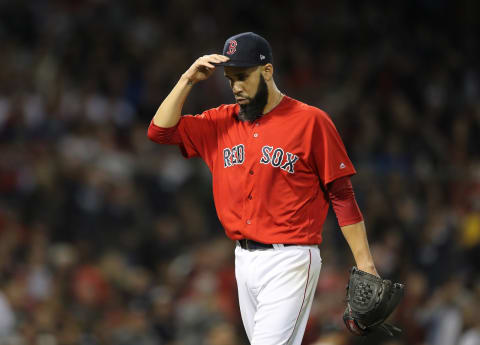
Let’s get the obvious out of the way first. David Price added to his lengthy list of failures as a postseason starter, failing to make it out of the second inning in a Game 2 loss to the New York Yankees in the ALDS. A pair of mammoth home runs brought an early end to Price’s night but not to his role in the Red Sox rotation.
Price will take the mound in Game 2 against the Astros.
This will be the 11th start that Price has made in his postseason career. He’s still seeking his first playoff win as a starter, compiling a 0-9 record and 6.18 ERA in that role.
Alex Cora saw firsthand when he served as bench coach for the Astros last October that Price could thrive on the postseason stage. He tossed 6 2/3 scoreless innings against Houston, albeit in a pair of relief appearances. Now the Red Sox manager is asking Price to do the same as a starter.
While the Yankees clearly had his number this year, Price has had success against the Astros. He’s 1-0 with a 3.65 ERA in two starts against them this year. We may always be uneasy about Price starting a playoff game but at least we can feel better about him in this series than we did against New York.
Expect Price to be on a short leash. He shouldn’t be left in to face this dangerous Astros lineup a third time through the order but if he can give them four or five solid innings then it wouldn’t be all that different from the performance he provided in last year’s series.
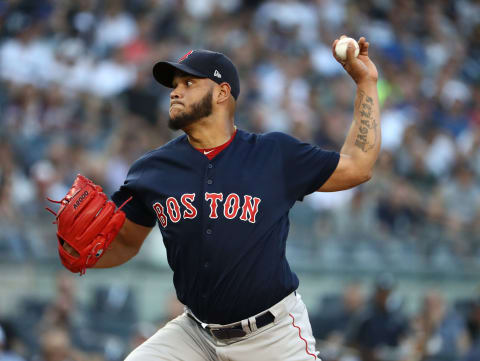
The much-maligned Red Sox bullpen was better than advertised despite a couple of near meltdowns (more on that later). Ryan Brasier shook off the postseason jitters from a shaky Game 1 to bounce back with a pair of solid appearances. Matt Barnes and Joe Kelly were both rock solid. Even Heath Hembree was surprisingly effective. If the Red Sox can count on those guys in the later innings it would vastly increase their chances of beating the Astros.
The concern is if a starter gets knocked out of the game early. Boston’s bullpen doesn’t have enough reliable arms to patch together six or more innings. That’s a scenario in which they’d need a long reliever to give them a few innings, a role currently being filled by Eduardo Rodriguez.
This is assuming that E-Rod remains in the bullpen, which seems likely with Nathan Eovaldi earning the opportunity to remain in the rotation with an impressive outing against the Yankees. Rodriguez hasn’t done anything to warrant a rotation spot. He struggled against the Astros this year, allowing five runs in 3 1/2 innings. One of the lowlights of the ALDS was the three-run homer Rodriguez allowed to Gary Sanchez to put Game 2 out of reach.
Rodriguez now owns a brutal 16.88 ERA in three postseason appearances, all in relief. Reasons to feel confident about E-Rod are hard to come by but the Red Sox will need him. With Steven Wright ineligible after being scratched from the ALDS roster with a knee injury, Rodriguez is the ideal multi-inning option.
Or at least he would be if he showed signs of being the pitcher he has been in the regular season. Rodriguez’ career has been plagued by injuries but he’s shown a high ceiling when healthy. Now he needs to show it in October.
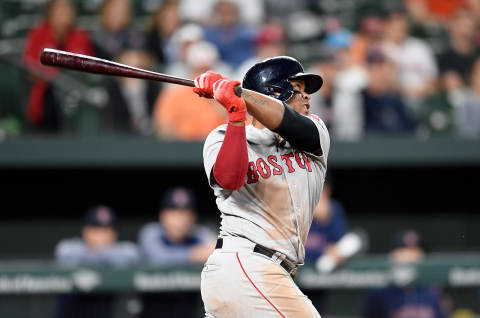
Is it fair to ask a 21-year old to step up under the spotlight? Probably not but the Red Sox are going to need more out of Rafael Devers.
The young third baseman was fine during the ALDS, going 2-for-7 (.286) with an RBI. Neither of those hits went for extra bases though and Boston needs Devers to be the power threat that Eduardo Nunez (2-for-11 in the ALDS) isn’t.
Devers started only once in the four-game series against the Yankees but will be counted on more against Houston. The pitching matchups played a part in the lineup construction with Devers sitting against lefties J.A. Happ and CC Sabathia. The Astros rotation is predominantly right-handed. The lone exception is Dallas Keuchel, a rare southpaw with reverse splits that Boston shouldn’t fear using their left-handed bats against.
His defense was the other reason Devers spent much of the ALDS on the bench. He led the league with 24 errors and posted a concerning -13 defensive runs saved. You can’t afford to lose a playoff game by making sloppy mistakes. However, it’s not as if Nunez brings an elite glove to the hot corner. While he deserves credit for making an outstanding play charging a slow roller to put away the decisive game of the ALDS, Nunez made his fair share of miscues against the Yankees. If neither player can be counted on to play solid defense, give me the bat that can change the game with one swing against a loaded Astros pitching staff.
Or just let the criminally underused Brock Holt play third so he can hit for the cycle again.
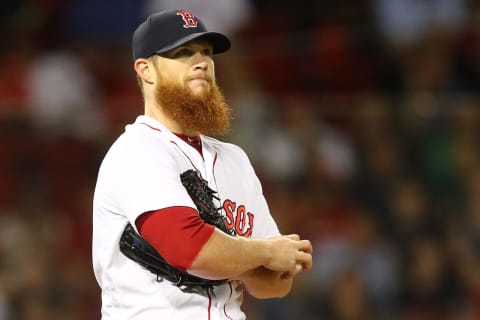
The one piece to this bullpen the Red Sox were supposed to feel good about was their closer. That wasn’t the case in the ALDS.
Craig Kimbrel wasn’t the lights-out pitcher we’ve trusted to lock down the ninth inning. While he managed a pair of saves against the Yankees, both appearances were shaky.
More from Red Sox News
- Red Sox Nation deserves far more from Fenway Sports Group
- Bizarre trade deadline comes back to haunt Red Sox after Nathan Eovaldi departure
- Red Sox’ Moneyball-style offseason continues with Corey Kluber contract
- Rich Hill’s Red Sox departure puts him within striking distance of unique MLB record
- Red Sox offseason takes another nasty hit with Nathan Eovaldi departure
Kimbrel completed a four-out save in Game 1 with three strikeouts but not without coughing up a solo home run to Aaron Judge. That cut Boston’s lead to one, turning what appeared to be an early route into a nail-biter.
Game 4 saw Kimbrel come dangerously close to a meltdown that would have evened the series. Normally, it’s Kimbrel who is the intimidating presence with his pterodactyl stance and blazing fastball. This time, he was the one who looked shook.
Kimbrel couldn’t find control of his breaking ball, walking a pair of batters and allowing a base hit to load the bases with one out. He’s lucky that Giancarlo Stanton did him a favor by chasing a curve well out of reach for strike three for that first out. A hit by pitch pushed in a run, followed by a sac fly to bring the Yankees within a run. New York had the tying run in scoring position and the winning run on first while Boston was on the verge of a panic attack.
It took a great play by Nunez and Steve Pearce stretching out as far as he could while keeping his foot on the bag to end the game. Kimbrel escaped the jam but not without forcing us to question how much we can trust him.
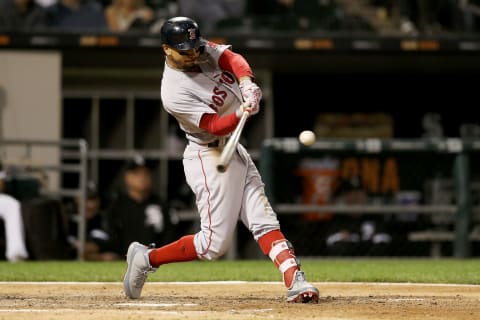
Mookie Betts is the frontrunner for the AL MVP but he was hardly the most valuable player in the ALDS.
The series started with a solid 1-for-3 performance that included a walk, double and a run scored for Betts. He also had a pair of hits with two runs scored and two RBI in Game 3, although essentially everyone pitched in during that 16-run shellacking. The other two games saw Betts go a combined 0-for-8.
Overall, he was 3-for-16 (.188) with only one extra-base hit. He uncharacteristically struck out four times and drew only three walks, one of which was of the intentional variety.
Betts was solid in last year’s series against Houston, hitting .313 with two doubles, a pair of runs and a stolen base. He’s proven capable of performing on the postseason stage so this doesn’t seem to be a matter of a young player shrinking in the spotlight. He’s simply struggling to consistently produce against quality pitching.
He may not classify himself as a power threat but Betts did blast 32 home runs this year and led the league in extra-base hits. Yet he’s never hit a home run in the postseason and has only four extra-base hits in 42 career postseason at-bats. Manufacturing runs can be more difficult in the postseason, especially against a pitching staff as imposing as Houston’s. Betts needs to come through with more than a few singles if Boston is going to keep up with a deep Astros lineup.
Next. Ranking the top 30 Red Sox prospects. dark
The Red Sox offense goes as Betts goes. He’s the spark that ignites the fire. He’s too good to be kept quiet for long but the Red Sox need their best player to snap out of his funk before it’s too late.